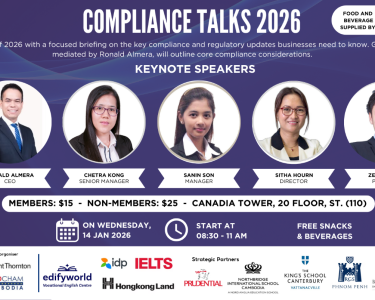Cambodia Investment Review
The July meeting of the Private Sector Working Group-D (PSWG-D), held at the Cambodia Chamber of Commerce, saw fresh momentum on key taxation and trade issues as government and private sector representatives gathered to iron out regulatory inefficiencies and enhance investor confidence.
According to an announcement, the agenda covered two opening issues, two new challenges, one follow-up item, and two cases marked as resolved, with the Technical Working Group on Tax (TWG) providing important updates on procedural reforms. The discussions signal a continued focus by Cambodian authorities on removing ambiguity in tax policy and streamlining business operations, especially as the Kingdom navigates global economic headwinds and rising regional competition.
Read More: Private Sector Working Group-D Addresses Key Tax Issues in February 2025 Meeting
New Issues Reflect Rising Demand for Regulatory Clarity
Among the newly raised concerns was the lack of defined timelines for the approval of OCL (Operational Compliance Letters) and Certificates of Origin (CO)—critical documents for cross-border trade. Delays in processing these applications have added uncertainty for exporters and manufacturers reliant on time-sensitive shipments.
Additionally, businesses flagged a lack of clarity on how to apply for relief under Cambodia’s Double Taxation Agreements (DTAs), a vital mechanism for avoiding tax duplication for cross-border investors. The concern underlines the need for more accessible guidelines and standardized procedures to better support Cambodia’s integration into the global investment ecosystem.

Import Duties on Luxury Boats and Year-End Billing Deadlines in Focus
Two longstanding issues were brought forward for discussion:
- The proposal to reduce import duties and excise taxes on yachts and pleasure boats aims to foster growth in Cambodia’s underdeveloped marine tourism sector. With regional neighbors like Thailand and Vietnam already leveraging maritime leisure markets, stakeholders argued that Cambodia risks falling behind unless it adjusts its tax regime to attract high-end investors and private vessels.
- A technical issue regarding progress claims submitted more than seven days after December 31 also resurfaced, with the private sector calling for flexibility in the billing process during the year-end rush. The request seeks to minimize penalties on delayed invoices caused by operational bottlenecks during the holiday period.
Follow-Up and Closure on Taxation Topics
A follow-up discussion revisited a critical issue first raised in November 2024: the interest rate on loans between related parties. The topic continues to generate debate, as businesses seek greater clarity on how to comply with Cambodia’s transfer pricing regulations while avoiding tax penalties.
Meanwhile, two issues were officially resolved and closed:
- The first addressed whether share premiums are subject to tax, a grey area that had created hesitancy among capital investors. Recent clarifications have helped ease those concerns.
- The second was the treatment of deemed salary for company directors, particularly in family-run or closely held firms. The closure of this issue suggests clearer guidance has now been issued.

TWG Tax Updates: Merger Obligations and Regime Transfers
The Technical Working Group on Tax presented two key updates designed to support better compliance:
- A new instruction was issued outlining tax obligations during business and share transfers, or enterprise mergers, giving companies a firmer foundation for managing liabilities during restructuring.
- A new Standard Operating Procedure (SOP) was also introduced to define the process for taxpayer classification transfers under the Self-Declaration Regime—a move likely to benefit small and medium-sized enterprises looking to formalize operations.
Private Sector Engagement Still the Key to Progress
As Cambodia looks to maintain its economic momentum, platforms like the PSWG-D meeting are becoming increasingly vital. While policy shifts are taking place, the challenge remains in the consistent enforcement and interpretation of new tax rules and administrative procedures.
The private sector continues to urge the Royal Government of Cambodia to pair reform with clarity. As one senior participant noted informally, “The pace of policy evolution is welcome—but unless implementation catches up, it risks being reform on paper only.”





